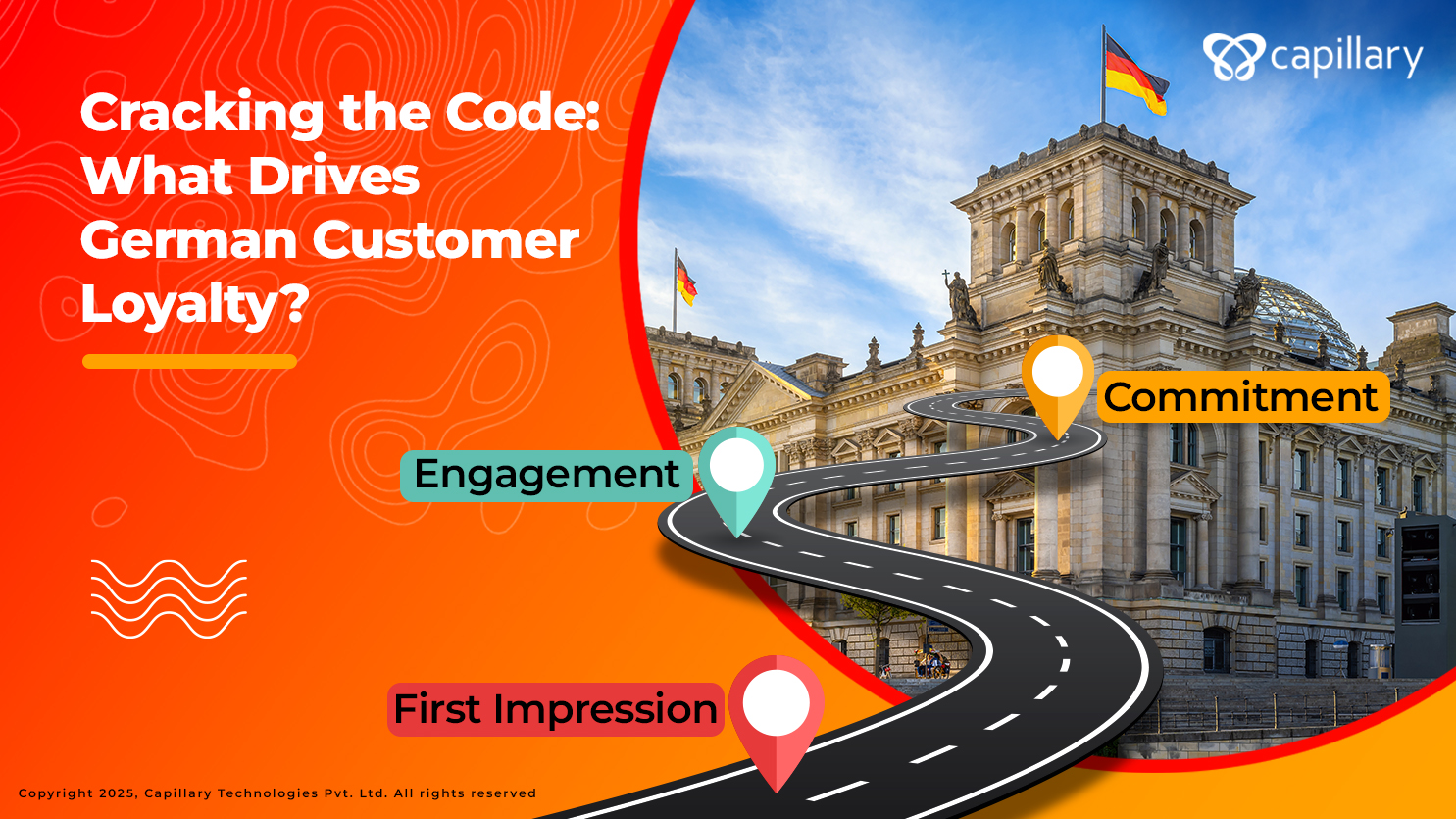- Design industry shaping loyalty programs
- Integrate easily and go live quicker
- Deliver hyper-personalized consumer experiences
Blue Rewards from Al Futtaim Group Shares Loyalty Success Stories and Evolution. Watch Podcast >
Capillary Announces 2nd Annual Captivate 2025 Summit: Transforming Loyalty Management with New AI Tech Read more >

In Germany, loyalty is not merely a transactional exchange; it’s a dynamic relationship built on trust, authenticity, and shared values. Unlike markets where loyalty programs rely heavily on frequent promotions or gamified experiences, German consumers approach loyalty with a pragmatic and discerning mindset. This makes building brand loyalty in Germany a complex but highly rewarding endeavor.
By conceptualizing loyalty as a relationship lifecycle, brands can develop strategies that resonate with German cultural and psychological nuances. Let’s dive into the intricacies of this lifecycle, exploring how businesses can move customers from initial engagement to enduring brand advocates.
Trust is the currency of loyalty in Germany. For a brand, the first interaction with a consumer can set the tone for the entire relationship. German consumers, known for their attention to detail and skepticism, evaluate brands based on transparency, quality, and integrity.
1. Transparency and Clarity
Germans value straightforward communication and avoid ambiguity. Loyalty programs must clearly outline terms, conditions, and benefits. Programs with hidden fees or vague promises risk immediate rejection.
2. Ethical Data Practices
Privacy concerns run deep in Germany, stemming from historical experiences and reinforced by stringent GDPR regulations. Programs must emphasize data minimization, ethical collection, and clear opt-ins.
3. Quality First, Discounts Second
Unlike consumers in some markets who are drawn to discounts, Germans prioritize quality and long-term value. Loyalty programs should highlight rewards tied to high-quality products or services rather than fleeting discounts.
Analogy: A first impression in loyalty is like a handshake—it’s about setting the foundation for trust and showing reliability.
Once trust is established, brands must focus on engagement. Germans expect loyalty programs to deliver practical value while respecting their time and preferences. Emotional connections are cultivated gradually, often through consistent and meaningful interactions.
1. Omnichannel Loyalty Experiences
German consumers value convenience across physical and digital channels. Loyalty programs should integrate seamlessly with e-commerce platforms, mobile apps, and in-store systems.
2. Sustainability as a Loyalty Driver
Germany’s environmental consciousness is deeply ingrained in consumer behavior. Brands that incorporate sustainability into their loyalty strategies—such as rewards for eco-friendly purchases—align with these values.
3. Localized Personalization
While Germans value personalization, it must remain respectful and pragmatic. Overly invasive targeting can deter engagement. Tailored rewards based on past purchase behavior or regional preferences strike the right balance.
4. Gamification with Substance
Germans are methodical but not devoid of fun. Programs that incorporate gamified elements—like milestones, streaks, or surprise rewards—add an engaging layer to loyalty, provided they align with practical benefits.
Analogy: Engagement in loyalty programs is like dating—it’s about showing consistency, understanding preferences, and making meaningful gestures.
Commitment in German loyalty programs goes beyond repeat purchases. It’s about fostering emotional connections and creating a sense of belonging. Brands that succeed at this stage treat loyalty as a shared journey, emphasizing mutual respect and shared values.
1. High-Value and Experiential Rewards
Germans appreciate quality and exclusivity. Rewards that emphasize craftsmanship, durability, or unique experiences resonate deeply.
2. Merit-Based Loyalty Systems
Tiered loyalty programs appeal to Germany’s emphasis on fairness and achievement. By rewarding increased engagement with premium perks, brands create aspirational loyalty structures.
3. Long-Term Alignment with Customer Values
Sustainability, corporate responsibility, and ethical practices are key. Programs that demonstrate alignment with these values foster deep emotional connections, turning customers into brand advocates.
4. Community-Centric Loyalty
Germans value the sense of community and shared purpose. Programs that foster social connections—like exclusive events or loyalty communities—help brands build strong emotional bonds.
Analogy: Long-term loyalty is like marriage—it’s about mutual investment, shared goals, and unwavering trust.
1. Data Overreach
2. Generic Rewards
3. Over-Personalization
Capillary Technologies understands the nuances of building loyalty in a culturally sophisticated market like Germany. Our solutions are designed to:
In Germany, loyalty programs must go beyond short-term incentives and focus on building long-term, meaningful relationships with customers. By approaching loyalty as a relationship lifecycle—from first impressions to lifelong commitment—brands can foster trust, engagement, and emotional connections with German consumers.
After all, loyalty in Germany is not about earning points; it’s about earning respect, trust, and enduring relationships. For brands willing to invest in thoughtful, culturally aligned strategies, the reward is loyal customers who stand by them through every phase of their journey.

March 21, 2025 | 4 Min Read
In Germany, loyalty isn’t won with discounts. Learn how tr